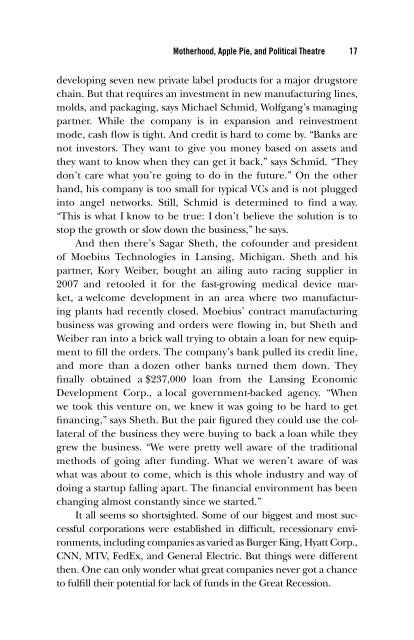3c hapter - Index of
3c hapter - Index of
3c hapter - Index of
Create successful ePaper yourself
Turn your PDF publications into a flip-book with our unique Google optimized e-Paper software.
Motherhood, Apple Pie, and Political Theatre 17<br />
developing seven new private label products for a major drugstore<br />
chain. But that requires an investment in new manufacturing lines,<br />
molds, and packaging, says Michael Schmid, Wolfgang’s managing<br />
partner. While the company is in expansion and reinvestment<br />
mode, cash fl ow is tight. And credit is hard to come by. “Banks are<br />
not investors. They want to give you money based on assets and<br />
they want to know when they can get it back,” says Schmid. “They<br />
don’t care what you’re going to do in the future.” On the other<br />
hand, his company is too small for typical VCs and is not plugged<br />
into angel networks. Still, Schmid is determined to fi nd a way.<br />
“This is what I know to be true: I don’t believe the solution is to<br />
stop the growth or slow down the business,” he says.<br />
And then there’s Sagar Sheth, the c<strong>of</strong>ounder and president<br />
<strong>of</strong> Moebius Technologies in Lansing, Michigan. Sheth and his<br />
partner, Kory Weiber, bought an ailing auto racing supplier in<br />
2007 and retooled it for the fast- growing medical device market,<br />
a welcome development in an area where two manufacturing<br />
plants had recently closed. Moebius’ contract manufacturing<br />
business was growing and orders were fl owing in, but Sheth and<br />
Weiber ran into a brick wall trying to obtain a loan for new equipment<br />
to fi ll the orders. The company’s bank pulled its credit line,<br />
and more than a dozen other banks turned them down. They<br />
fi nally obtained a $237,000 loan from the Lansing Economic<br />
Development Corp., a local government- backed agency. “When<br />
we took this venture on, we knew it was going to be hard to get<br />
fi nancing,” says Sheth. But the pair fi gured they could use the collateral<br />
<strong>of</strong> the business they were buying to back a loan while they<br />
grew the business. “We were pretty well aware <strong>of</strong> the traditional<br />
methods <strong>of</strong> going after funding. What we weren’t aware <strong>of</strong> was<br />
what was about to come, which is this whole industry and way <strong>of</strong><br />
doing a startup falling apart. The fi nancial environment has been<br />
changing almost constantly since we started.”<br />
It all seems so shortsighted. Some <strong>of</strong> our biggest and most successful<br />
corporations were established in diffi cult, recessionary environments,<br />
including companies as varied as Burger King, Hyatt Corp.,<br />
CNN, MTV, FedEx, and General Electric. But things were different<br />
then. One can only wonder what great companies never got a chance<br />
to fulfi ll their potential for lack <strong>of</strong> funds in the Great Recession.
















